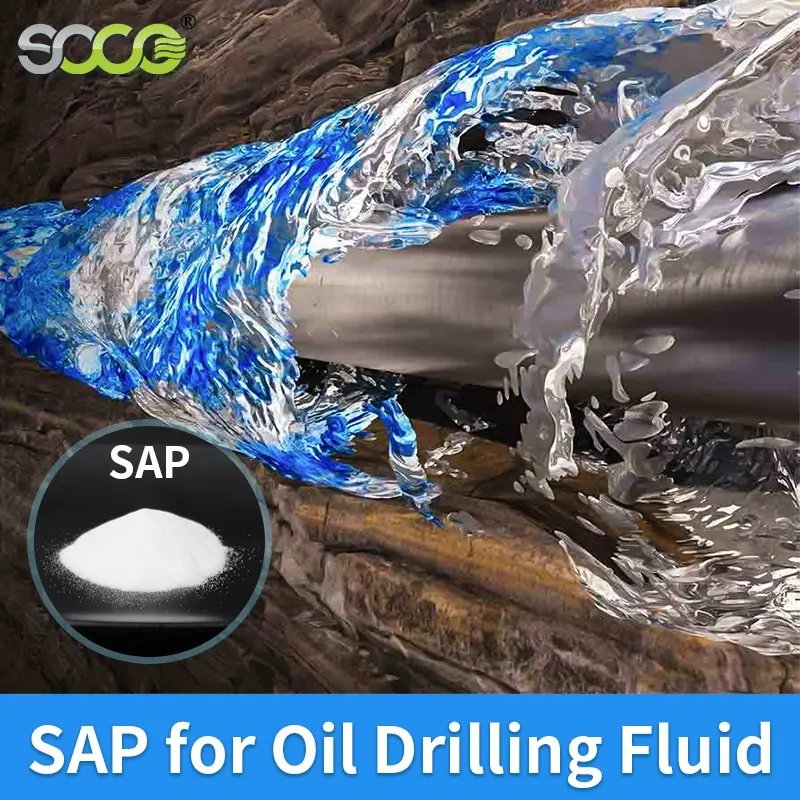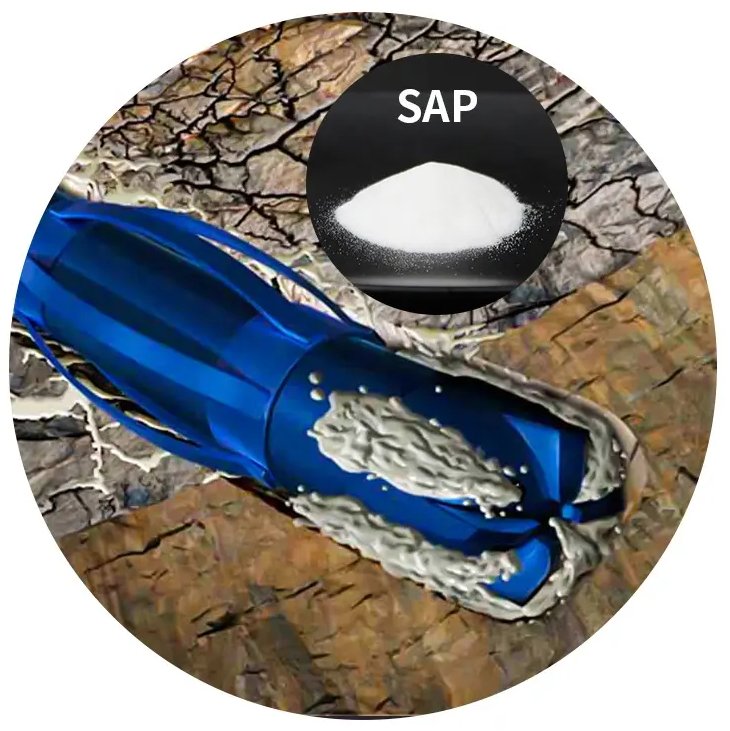Get Free Sample
Drilling fluid, also known as drilling mud, is an important part of the oil and gas drilling process. It serves multiple purposes, including cooling and lubricating drill bits, transporting cuttings to the surface, and maintaining wellbore stability. Here are some basic materials used in drilling fluids:

Water: The base fluid of most drilling muds is water. It is used as the main ingredient in mixing various additives.
Clay: Bentonite clay is commonly used to increase the viscosity and suspending properties of drilling fluids. It helps prevent borehole collapse and control fluid loss.
Barite: Barite or barium sulfate is used to increase the density of drilling mud. Higher mud density helps control well pressure and prevent blowouts.
Polymer additives: Add polymers such as sodium polyacrylate(SAP) to enhance the viscosity and lubrication properties of the mud. They increase the efficiency of the drilling process.
Weighting agents: In addition to barite, other weighting agents such as hematite or ilmenite can also be used to increase mud density while maintaining the required rheological properties.
Corrosion Inhibitors: These chemicals are added to prevent corrosion of the drill string and downhole equipment due to contact with universal drilling fluids.
Surfactants: Surfactants help reduce surface tension and improve the wettability of drill cuttings, making them easier to remove from the wellbore.
Fluid Loss Agents: These additives, such as CMC, are used to minimize fluid loss in the formation and improve wellbore stability.
pH adjusters: These substances help maintain the pH of the polymer slurry drilling within the desired range, preventing clay swelling and maintaining the integrity of the mud.
Biocides: Biocides are used to control the growth of microorganisms in polymer mud drilling fluid, which can cause a variety of problems if not controlled.
Emulsifiers: Emulsifiers are added to oil-based drilling muds to stabilize the oil-water mixture and improve its performance under certain drilling conditions.
Lost circulation materials: These materials, such as shredded fiber or mica, are added to drilling mud polymer to help seal fractures in the formation and prevent fluid loss.
Shale Inhibitors: These additives help control the expansion of shale formations, which can cause problems during drilling operations.
Sodium Bicarbonate: Used to maintain an alkaline pH in drilling fluids when drilling through formations that may be acidic.
Drilling fluid lubricants: Lubricants are added to reduce friction and wear on drilling equipment, especially drill bits.
Selecting the correct polymer additive for a drilling fluid (also known as drilling mud) is a critical step in optimizing drilling fluid performance for a specific drilling operation. The choice of polymer additive depends on a variety of factors, including specific drilling conditions, wellbore stability requirements, and the type of drilling fluid used (water-based, oil-based, or synthetic-based). Here are some key considerations for selecting polymer additives:
Drilling fluid polymers are essential additives in drilling muds used in the oil and gas exploration industry. 
Determine the required rheological properties of a polymer drilling fluids such as viscosity, yield point and gel strength. Different polymers have different effects on these properties. For example, sodium polyacrylate can increase viscosity, while carboxymethylcellulose (CMC) can provide shear-thinning behavior.
Consider the geological characteristics of the formations you will encounter. Certain formations may be sensitive to certain polymers. For example, certain clays may interact negatively with certain polymers, causing wellbore instability. Understanding its formation is critical to selecting compatible polymers.
Evaluate expected downhole temperature and pressure conditions. Some polymers are more stable under high temperature and pressure. Synthetic polymers such as SAP sodium polyacrylate biodegradable are known for their temperature and pressure stability.
Evaluates the salt content in a formation or drilling fluid. Some polymers may require the addition of salt (such as potassium chloride) to enhance their properties, while others perform better in low-salt environments.
Consider any environmental regulations and restrictions that may apply to drilling operations. Some polymer additives may be required to meet specific environmental compliance standards.
Determine whether you are using a water-based, oil-based, or synthetic-based polymer drilling. Polymer selection may vary based on fluid type, as some polymers are more compatible with oil-based muds.
Make sure the selected polymer additive is compatible with other additives in the polymer drilling mud, such as emulsifiers, weighting agents and surfactants.
Clearly define performance targets for the drilling fluid. Different polymers can enhance filtration control, cuttings suspension and lubrication to varying degrees.
Weigh the cost-benefit of polymer additives. High-performance polymers can cost more, so balancing performance with budget constraints is critical.
Field testing or laboratory testing is conducted to evaluate the performance of different polymers under conditions similar to those found in drilling operations. This can help determine the most suitable polymer additive.
Consult a drilling fluid expert, chemist, or polymer expert with experience in your project's specific geology and drilling conditions.
The composition of drilling fluids may vary depending on the specific requirements of the well being drilled and the geological formations encountered. Properly formulated drilling fluids are critical to the success and safety of drilling operations.
As a professional manufacturer of sodium polyacrylate, Qingdao SOCO New Materials Co., Ltd. has been engaged in the chemical industry for more than ten years. It has professional industry knowledge and has professional solutions for the drilling fluid industry. If you need polymer water-absorbing materials in drilling fluids, please contact us. contact us.
Drilling fluid curing agents are an important class of chemical additives specifically designed to improve the performance of drilling fluids in drilling operations.
We have “Ask The Expert” online service 24/7. If you have any questions please contact us.